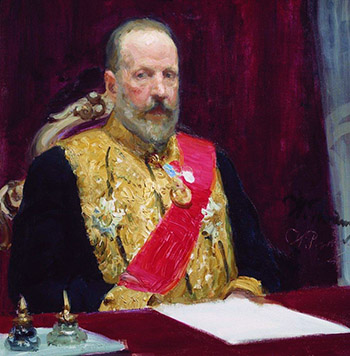Sergei Witte (1849-1915) was simply one of the most important statesmen of the last decades of imperial Russia: finance minister from 1892 to 1903 (a very powerful position) and chairman of the council of ministers 1903 to 1905 (a not so powerful position). Although appointed to his offices by first tsar Aleksandr III and then by Nikolai II, and although he directed a sweeping economic transformation of the empire, it is pretty amazing that he was able to accomplish as much as he did given internal opposition to his policies from the Russian court and landed gentry and given the fact that it unclear if he really every enjoyed the total confidence of either tsar. His multi-volume memoirs, published posthumously, in the United States in 1921, became an important source of information about Russian politics at the turn of the twentieth century.
Elsewhere in the course, I have written:
Sergei Witte, appointed minister of finance in 1891, greatly intensified Russian railroad construction and made the railways, for the first time, serve the needs of industry by linking manufacturing centers with their sources of raw materials (heretofore, Russian railways were designed solely to serve military and agricultural export needs).
Witte made his name working on the railroad, figuratively speaking. He actually did work in a number of railroad posts until in 1887 he became director of the state railways in the ministry of finance (later promoted to Minister of Finance). There he developed the "Witte system," a program of heavy industrialization, focusing on railway construction--of course--that was designed to allow Russia to catch up with the more advanced western countries in a decade or so and also allow Russian exports to reach markets in the Near and Far East. Witte was the first to imagine (and then carry out) the use of massive state intervention in the economy to develop a national economy. Above all, he wanted to bring Russia up to European living standards. Under Witte, Russia did experience sustained economic growth rates that improved living standards for the Russian people. He was never able to undertake an agrarian reform that would have complemented what he had undertaken in industry and finance (such as the gold standard 1897).
Witte's focus on industry, his success in negotiating an end to the Russo-Japanese War and his work in crafting an end to the disturbances of 1905 and the creation of a semi-parliamentary regime in Russia made Witte's rivals incredibly jealous, including the tsar, and he was dismissed from power. But his vision was one of Russia as a modernized country equal to any of its contemporaries in Europe.
Some suggested websites
- The Fight for Russian Industry (1912)
- Sergei Witte on the Economic Challenge to Russia
- Charles Conant, Russia as a World Power, from The North American Review, 168 (February 1899).
- Read a contemporary explanation of Russia's lack of any substantial industry.
- Some interesting comments by contemporaries about Witte.
- Secret Memorandum on Industrialization, which is similar to Sergei Witte on the economic challenge to Russia or Sergei Witte on the tasks for economic policy
- The Witte System
- Excerpts from his memoirs focusing on tariffs and the imperial court (There is also a short biography on the latter website.).
- There are numerous online encyclopedia entries for Witte.
- PS. Yes, it is OK to start with the Wikipedia entry. (The Russian version is much longer; see also the entry in the Russiapedia.) There are other assorted biographical materials online, such as the Alexander Palace Time Machine or Russian industrialization.
- You will also find articles about Witte if you check Project Muse (available on the NOVA library page).
- Memoirs of Count Witte
